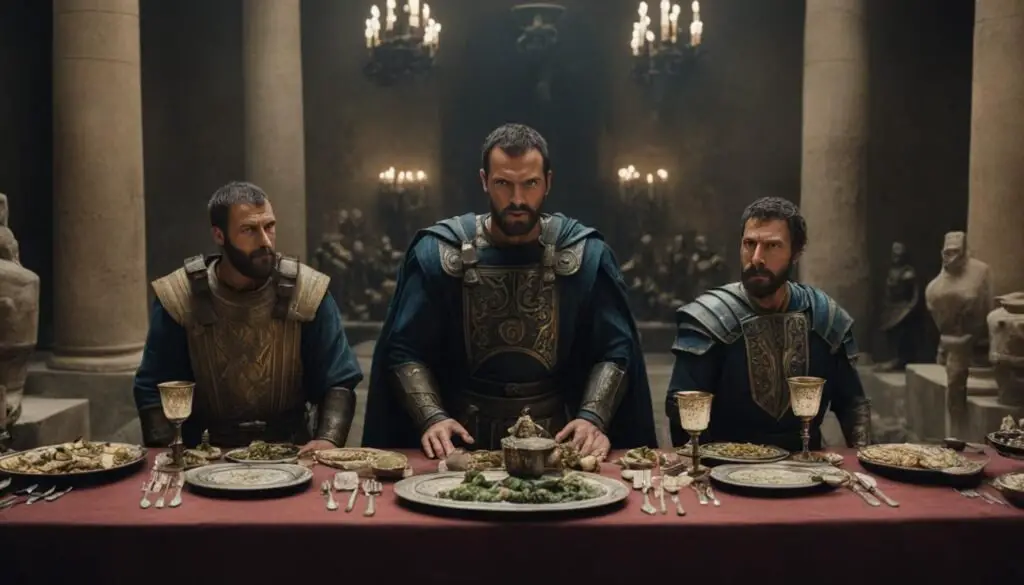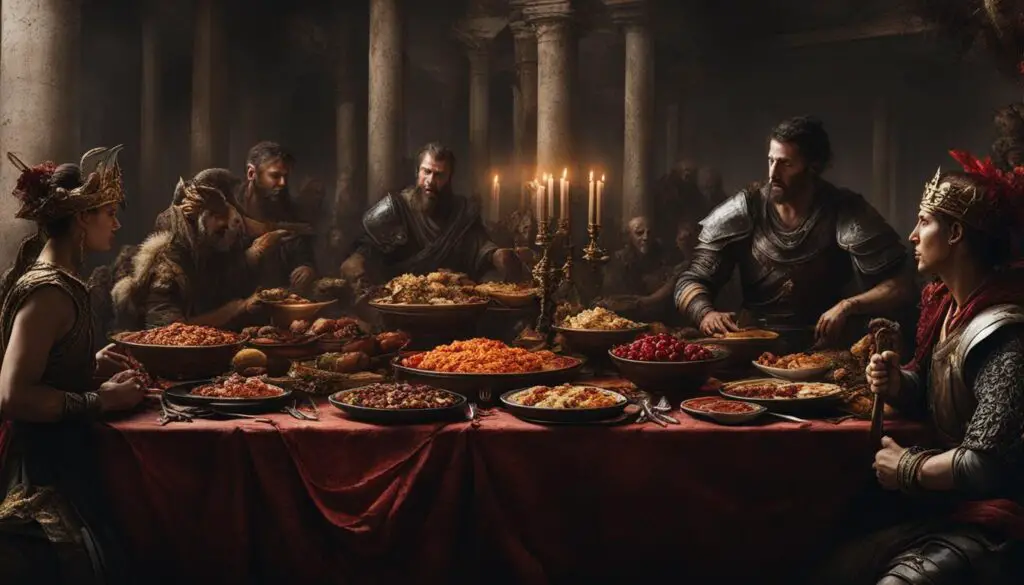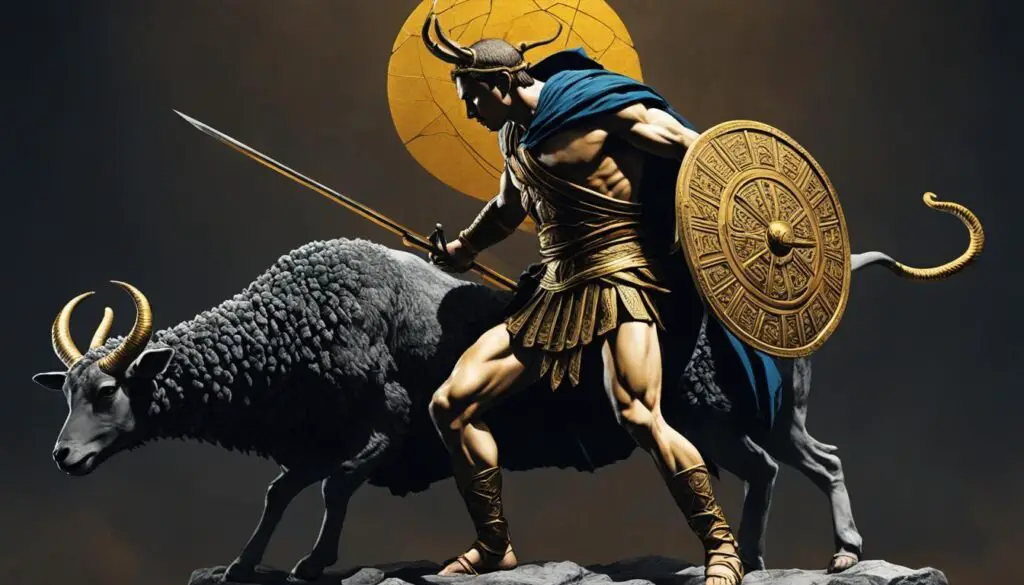Greek mythology is a treasure trove of intriguing characters and captivating tales. Among these figures, Atreus, the king of Mycenae, stands out for his pivotal role in the House of Atreus and the tragic events that unfolded within his lineage.
Who is Atreus in Greek mythology? Atreus was the son of Pelops and Hippodamia, and his descendants are known as Atreidai or Atreidae. His story is steeped in betrayal, revenge, and tragedy, highlighting the dark underbelly of power and ambition.
Key Takeaways:
- Atreus was a prominent figure in Greek mythology, known for his role in the House of Atreus and the curse that plagued his bloodline.
- He and his twin brother Thyestes were exiled for their involvement in the murder of their half-brother, setting the stage for their ongoing feud.
- Atreus’ revenge against Thyestes, in the form of a horrifying banquet, showcased the depths of betrayal and darkness within the House of Atreus.
- Aegisthus, born from Atreus’ marriage to Pelopia, added another layer of tragedy to the family’s already twisted dynamic.
- The legacy of the House of Atreus serves as a cautionary tale, exemplifying the destructive consequences of familial betrayal and the redemptive power of forgiveness.
The Origins of Atreus and His Family
The story of Atreus in Greek mythology is deeply intertwined with his family lineage, which traces back to his father, Pelops. Pelops’ legendary victory in the chariot race against King Oenomaus secured his marriage to Hippodamia, ultimately giving rise to the House of Atreus.
Pelops’ actions, however, carried a heavy price. In his pursuit of victory, he resorted to deceit and murder, killing his charioteer Myrtilus. This act unleashed a curse upon Pelops and his descendants, forever shaping the fate of the Atreus family tree.
The Curse on the Atreus Family
The curse placed upon Pelops and his bloodline serves as a central element in understanding Atreus’ role in Greek mythology. It is said that the curse brought forth a series of tragic events, inflicting suffering and chaos upon the House of Atreus for generations to come.
The curse’s impact, which continues to be felt throughout the mythological tales of Atreus and his family, showcases the destructive power of destiny and the consequences that arise from immoral actions.
The image above depicts the illustrious and twisted Atreus family tree, revealing the intricate connections and the unfolding tragedy that befell its members.
Atreus and Thyestes: A Vicious Feud Unleashed

The House of Atreus is shrouded in darkness and tragedy, with the rivalry between Atreus and Thyestes serving as a central theme in its mythology. The seeds of this bitter conflict were sown when the brothers committed a heinous act, murdering their stepbrother Chrysippus in their quest for power. As a result, they were exiled and forced to seek refuge in Mycenae.
The animosity between Atreus and Thyestes only intensified over time. Atreus, fueled by his ambition and desire for revenge, managed to ascend the throne of Mycenae, while Thyestes plotted his betrayal and subsequent exile. The deep-seated hatred that brewed between the two brothers formed the foundation for the tragic events that would unfold.
The Curse of Betrayal and Revenge
The conflict between Atreus and Thyestes represents the ultimate betrayal within the House of Atreus. Each brother sought to outwit and outmaneuver the other, placing their personal vendetta above any sense of familial loyalty. This ongoing feud would have dire consequences, not only for Atreus and Thyestes but for future generations as well.
A Tragic Legacy Unleashed
The consequences of Atreus and Thyestes’ bitter feud reverberated throughout the House of Atreus, resulting in a series of tragic events that spanned generations. Their actions set off a chain reaction of violence, revenge, and despair, leaving a dark imprint on the family’s legacy.
As the House of Atreus unravels, it becomes a cautionary tale of the destructive power of envy, ambition, and unchecked revenge. It serves as a chilling reminder that such actions can tear families apart, sow the seeds of eternal suffering, and perpetuate a cycle of cruelty.
Atreus, Thyestes, and the Horrifying Banquet

Atreus’ revenge against Thyestes is a chilling tale of betrayal and deception. The infamous banquet in which Atreus serves Thyestes the flesh of his own children is a gruesome act of revenge that highlights the darkness within the House of Atreus. This horrific feast serves as a turning point in the family’s history, leading to further tragedy, curses, and the perpetuation of the cycle of violence.
Atreus, consumed by anger and a desire for retribution, devises a plan to deceive Thyestes and exact his revenge. In a horrifying twist, Atreus serves Thyestes a meal prepared from the cooked flesh of his own unsuspecting children. This act of cannibalism showcases the depths of Atreus’ hatred and the extreme measures he is willing to take in his pursuit of vengeance.
The banquet marks a turning point in the tragic saga of the House of Atreus. The betrayal and gruesome act committed by Atreus sets the stage for the continued cycle of violence and bloodshed within the family. From this point onwards, the curse and the legacy of revenge plague future generations, leading to further treachery and the downfall of prominent figures in Greek mythology.
- The banquet signifies the depths of Atreus’ cunning and cruelty
- The act of serving Thyestes his own children’s flesh emphasizes the dark nature of the House of Atreus
- The feast marks a turning point in the family’s history, leading to further tragedy and the continuation of the cycle of violence
A Dark Secret Unveiled: Atreus, Pelopia, and Aegisthus

Within the dark history of the House of Atreus, there lies a hidden secret that adds yet another layer of tragedy and betrayal. It involves Atreus’ marriage to Pelopia and the birth of a figure named Aegisthus. Little did Atreus know that Aegisthus was not only his son but also his grandson, a product of the illicit union between Pelopia and Atreus’ own brother, Thyestes.
This revelation uncovers a web of deceit and incestuous relationships within the House of Atreus. Aegisthus’s dual heritage ties him intimately to both Atreus and his brother Thyestes, blurring the already twisted family dynamic. This unsettling truth sets the stage for further turmoil, bloodshed, and treachery within the fateful bloodline.
As the House of Atreus spirals deeper into darkness, the consequences of these forbidden relationships continue to shape its tragic destiny. The anguish and suffering caused by this dark secret serve as a haunting reminder of the destructive power unleashed when familial bonds are severed and boundaries are crossed.
In the center of this image, you can see a representation of Atreus, Pelopia, and Aegisthus, three intertwined figures caught in the web of their own family’s dark secrets. Their fates are destined to intersect in ways that will forever stain the legacy of the House of Atreus.
The Legacy of the House of Atreus

The House of Atreus holds a formidable legacy steeped in murder, betrayal, and vengeance. The curse cast upon the family by Tantalus casts a dark shadow, paving the way for an unending cycle of tragedy that spans across generations. The tale of the House of Atreus serves as a cautionary reminder, vividly portraying the devastating consequences of unbridled ambition, consuming jealousy, and relentless revenge.
Embodied in ancient Greek mythology, the House of Atreus stands as a chilling testament to the destructive power that lies within family dynamics. It serves as a stark reminder that unchecked desires and deep-seated resentments can lead to irreversible harm, forever staining the bloodline with sorrow and despair.
- The legacy of the House of Atreus is one of bloodshed, as family members turn against each other with fervor and brutality.
- The relentless pursuit of power and authority fuels the flames of betrayal and vengeance, leaving no room for mercy or redemption.
- The House of Atreus mythology serves as a captivating narrative that highlights the consequences of uncontrolled passions and the tragic spiral they inevitably create.
However, amidst the darkness that shrouds the House of Atreus, there is a glimmer of hope. The legacy is not solely defined by its atrocities, but also by the redemptive actions of Orestes, the son of Agamemnon and Clytemnestra. Orestes seeks forgiveness and takes responsibility for breaking the cycle of violence, offering a faint ray of light in this seemingly interminable tale of tragedy.
Conclusion
The story of Atreus in Greek mythology is a gripping tale of tragedy, betrayal, and vengeance. It begins with a curse placed on the family by Tantalus, setting the stage for the dark events that unfold in the House of Atreus. The rivalry between Atreus and Thyestes, fueled by their thirst for power and revenge, leads to unthinkable acts of violence and deception.
Despite the darkness that envelops the House of Atreus, there is a glimmer of redemption through the actions of Orestes. Seeking forgiveness and an end to the curse, Orestes brings closure to the cycle of violence, ultimately defining the legacy of the family. The House of Atreus serves as a somber reminder of the devastating consequences of familial betrayal and the everlasting impact it can have on successive generations.
Through the tragic story of Atreus and his descendants, Greek mythology imparts a powerful lesson on the destructive power of ambition, jealousy, and revenge. It warns us of the perils that come with violating the bonds of kinship and the need for forgiveness to break the cycle of violence. The House of Atreus stands as a haunting reminder of the consequences that befall those who succumb to the darker aspects of human nature.
FAQ
Who is Atreus in Greek mythology?
Atreus, a prominent figure in Greek mythology, was the son of Pelops and Hippodamia. He was the king of Mycenae, and his descendants are known as Atreidai or Atreidae.
What is the family tree of Atreus?
Atreus is the son of Pelops and Hippodamia. He has a twin brother named Thyestes. Their half-brother is Chrysippus.
What is the story of Atreus and Thyestes?
Atreus and Thyestes were exiled for murdering their half-brother, Chrysippus, in their quest for the throne. They took refuge in Mycenae, where Atreus eventually became the king. The rivalry between Atreus and Thyestes forms the foundation for the tragic events that follow.
What is the infamous banquet involving Atreus and Thyestes?
Atreus seeks revenge against Thyestes by serving him the flesh of his own children at a banquet. This gruesome act of betrayal highlights the darkness within the House of Atreus and leads to further tragedy, curses, and the perpetuation of the cycle of violence.
What is the secret involving Atreus, Pelopia, and Aegisthus?
Atreus unknowingly marries his brother Thyestes’ son, Pelopia. They have a son named Aegisthus, who becomes a significant character in Greek mythology.
What is the legacy of the House of Atreus?
The House of Atreus is marked by a dark legacy of murder, betrayal, and vengeance. The curse placed on the family by Tantalus sets the stage for a series of tragic events that span multiple generations. The legacy of the family is ultimately defined by the redemptive actions of Orestes, who seeks forgiveness and brings an end to the curse.
What can we learn from the story of Atreus in Greek mythology?
The story of Atreus serves as a cautionary tale, illustrating the destructive power of ambition, jealousy, and revenge. It emphasizes the consequences that ensue from familial betrayal and the importance of seeking forgiveness and redemption.




